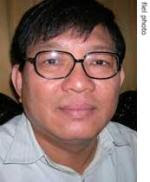26 Feb 2007Cambodian Press ReviewEven the most fundamental legal rights are being violated in Cambodian courts, and reform in the judicial system is progressing at a snails pace, the Centre for Social Development (CSD), wrote in its annual court watch report Friday, report newspapers.
The judicial system is suffering from a severe shortage in competent lawyers, and currently minors are often being tried without any legal counsel, said the report, writes Cambodge Soir.
In total 1,491 trials in the Phnom Penh, Kandal, Appeals and Supreme courts were observed by the organization between October 2005 and September 2006. Fifty-five percent of defendants were observed to be tried with no trained legal representation, while 39 percent were held in pre-trial detention for longer than the legal limit of six months, according to the report, reports The Cambodia Daily.
For minors, the monitoring found that 31 percent of under-18s were tried without counsel, while 46 percent were held in pre-trial detention for longer than six months. The legal time limit for juveniles to be kept awaiting trial is just two months, continues the newspaper.
Yeng Virak, director of judicial rights NGO the Community Legal Education Center (CLEC), expressed his regret in the report’s findings. “Is the judge’s trial of minors to show the law respect, or do they just want to teach them a lesson? I do not think that prison is a place of education for children, but it is a place which creates future criminals,”he said, writes Cambodge Soir.
Defendants were often refused the right to question their accusers, while in Phnom Penh Municipal Court 92 percent of trials took place without any witnesses, yet still held a conviction rate of over 90 percent, writes The Cambodia Daily.
CSD Director Theary Seng said at the launch of the report: “The right to justice has not been had by all. There are often no lawyers available or when there are they have difficulty meeting or contacting their clients, and they frequently have little time to prepare documents in order to protest in the hearings”, according to Cambodge Soir.
It is a severe shortage, a procedural problem and more importantly only the suspect normally appears in the hearing, without the presence of the victim or a witness, the lack of justice is more serious than the crime which has been caused,” she added.
According to Ke Sakhorn, the deputy director of the municipal court, the allegations that the court is not following proper legal procedures are from people found guilty who are bitter, and that the reason that victims and witnesses are not in the court is that they just do not show up, writes The Cambodia Daily. If half of the defendants monitored didn’t have lawyers, it is because they decided not to have one, he claimed.

























